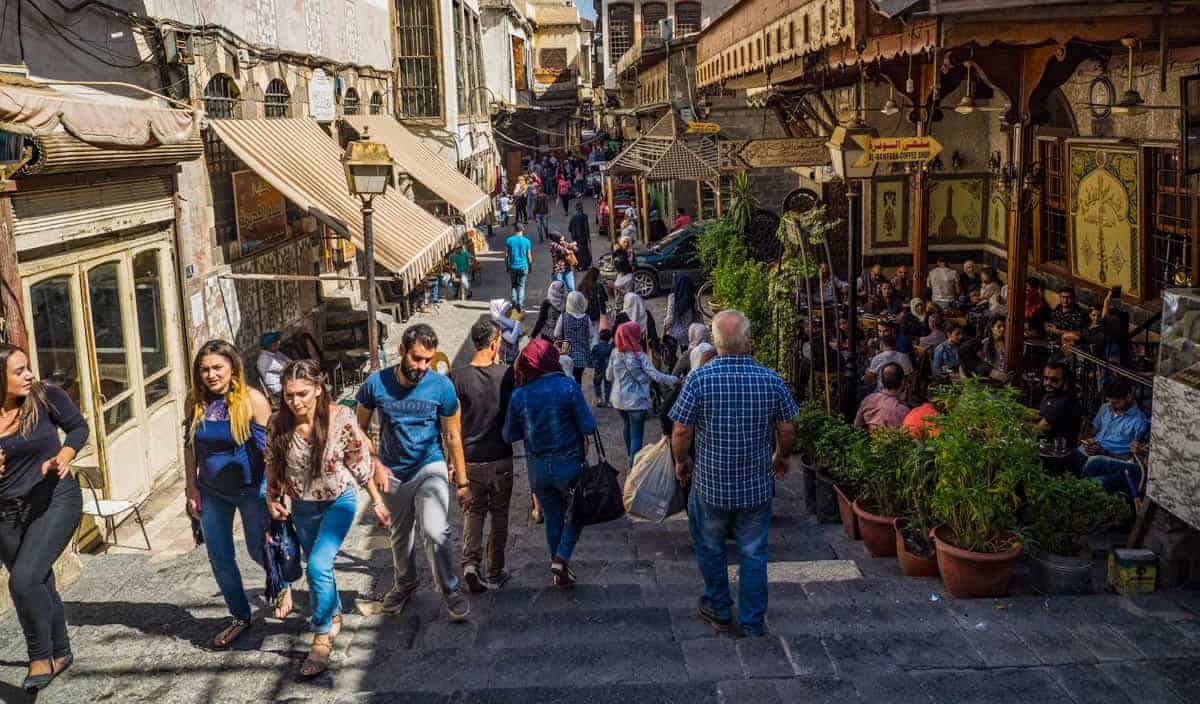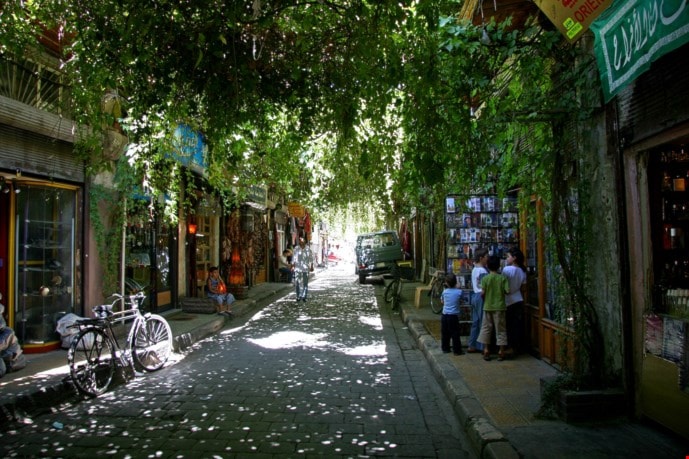Boutique Heritage hotel
In this journey, we will travel together to one of the oldest cities in the world. We will walk through its narrow lanes, check its archaeological markets, and search for an exciting adventure inside Damascus city, Syria’s capital and the oldest continuously inhabited capital in the world. For this purpose, I packed my bags, put my plan, and started my trip to Old Damascus city to experience a heritage boutique hotel called “Beit Al-Mamlouka” located within Bab Tuma neighborhood. This heritage hotel dates back to the seventeenth century; it was an old Levantine house. Then in 2005, the owner converted it into a boutique hotel.
With no further introduction, join me in this article, travel back in time to Damascus old city, spend a couple of days inside Beit Al-Mamlouka Boutique heritage hotel, and enjoy some of the oldest Levantine places in the world.

The old city of Damascus
Damascus is divided into two parts, the new city of Damascus and the old city of Damascus. The new city consists of all current services, luxurious markets, and different companies and institutions. However, within the ancient city, you may find all the magic, beauty, and excitement; this city was named (The City of Jasmine) due to the spread of jasmine flower inside Damascene homes. Damascus’s historical wall surrounds this old city, distinguished by holy sites such as mosques and churches. Moreover, in 1979, this ancient city was listed on the UNESCO World Heritage List.
Damascus has been famous for embracing arts, literature, and tourism and holding many archaeological and tourist areas. For example, the Umayyad Mosque, the Citadel of Damascus, and the statue of Saladin. Ancient baths such as Hammam al-Bakri and the Tekkiyat. Heritage markets, such as Al-Hamidiyah_Souq and Souk Sarouja. Besides, Damascus’s old neighborhoods (including Bab Tuma) to this day contain many historical and archaeological monuments that take you on a trip to this ancient city.

In the middle of Bab Tuma neighborhood
Bab Tuma neighborhood is a part of the Old City of Damascus. The area is named after Tuma gate, situated in the middle of the neighborhood and is one of the seven gates within Damascus’s historic wall.
This neighborhood is distinguished by its old paved paths, surrounded by Levantine houses and jasmine blossoms. Moreover, popular markets are spread within the area, which differs between shops offering the most delicate clothing, cosmetics, and fast food. On the other hand, you will also find shops selling souvenirs, gifts and Levantine meals.
Beit Al-Mamlouka heritage hotel located five minutes away from Bab Tuma main square, and arriving at the hotel was very easy due to its location in the central neighborhood street next to Bab Touma Square. I stood in front of the hotel’s door and knocked to start my journey inside one of the oldest places in Damascus’s old neighborhoods. Honestly, I was too excited.

Beit Al-Mamlouka – Five stars Hotel
When I first entered this boutique hotel, I questioned myself; How beautiful is it to grow up in such a house. Indeed, It is hard to tell.
As you enter, you will be greeted by a fountain surrounded by lemon trees, flowers, and shrubs. It will give you a strange and distinct feeling, mixed between beauty, originality, and the desire to discover more, in addition to the beauty of the well-arranged chairs and tables distributed in a harmonious way inside a roofless lobby. Everything inside was perfect, tidy, and clean. Moreover, the hotel staff was smiling and welcoming me from the very first moment. I felt like I had visited this place twenty times, although it was my first visit.
They preserved the house’s old heritage style in a beautiful way to travel with you in time to the seventeenth century when the house was built. You can check the original home’s stones protruding from the wall, neatly preserved and decorated. Moreover, they maintained the original wooden ceilings of the rooms, which were carefully restored.
Just opposite Beit Al-Mamlouka heritage hotel, you will find Hammam al-Bakri, which provides cleaning, massage, and steam services for its visitors, and is owned by Mr. Anton Mznar, the hotel’s owner as well. The idea is to provide an integrated hotel accommodation, where the hotel visitors can enjoy the traditional hammam experience and then enjoy the hookah inside the hammam lobby.
Beit Al-Mamlouka is more than a hotel stay
Above all, there is a unique secret about this place. It will resonate in the memories of its visitors. I did not know what was the secret at the beginning for being so relaxed and happy. However, when I met Mr. Anton, he described that we want our visitors to feel at home. It is not an ordinary hotel, so your stay should be extraordinary.
Therefore, each one of the employees will try to give you a unique and distinct feeling. They are dedicated to serving you, and they will pay great attention to the smallest details. I am sure you will agree with me, this is their SECRET!

Eight rooms in Beit Al-Mamlouka, but not numbered
Beit Al-Mamlouka hotel contains only eight rooms. However, these rooms are not numbered in the usual way but instead marked with historical figures worldwide. I stayed in Suleiman the Magnificent (lawgiver) suite, a double room on the ground floor, large and tidy, with an ensuite fountain and library. Remarkably, room service staff were attentive to the smallest details of the monotony inside the suite. If you care about little details – as I do – this hotel will meet your needs carefully and greatly.
The names chosen for the hotel rooms will surprise you; in other words, you will find yourself in front of a group of ancient historical figures:
- Suleiman the Magnificent (The lawgiver): The tenth and longest-reigning emperor of the Ottoman Empire. He ruled from 1520 until he died in 1566.
- Al-Zahir Baybars: Known as Baybars –nicknamed Abu Al-Fotouh– the fourth Sultan of Egypt during the Mamluk era.
- bn Sina: The father of modern medicine and one of the most influential doctors, astronomers, thinkers, and writers in the Islamic Golden Age.
- Hagia Sophia: The famous Turkish Byzantine landmark and one of the great monuments in the world.
- Ibn Battuta: Moroccan scientist, the explorer who traveled around the world in the past and became an example for many travelers.
- Antar and Abla: the Arabic romantic legends, the middle eastern Romeo and Juliet. Or what the hotel staff calls the lovers’ room.
- Harun al-Rashid: The fifth and the most famous of the Abbasid caliphs. He was mentioned even in foreign sources, such as the German annals during the reign of Emperor Charlemagne.
- Rushd: The famous scholar, Muslim musician, and Andalusian jurist.
A trip in the memory of Beit Al-Mamlouka hotel
Beit Al-Mamlouka hotel’s story goes back to the seventeenth century when the Ottoman empire ruled Damascus. It was initially an old Damascene (Shami) house, which the royal families rolled over for many years. However, this was the first house to be converted into a heritage hotel in Damascus. On the other hand, this Levantine house is distinguished by its decoration, wall carvings, and ornate wooden ceilings, which are considered the title of Damascene architecture and can be found in every Levantine house. Further, this building method aims to separate the house residents from the hustle and bustle outside so that its residents can enjoy a distinctive experience, wholly isolated from the outside.
Today, Beit Al-Mamlouka hotel is one of the most prominent heritage hotels in Damascus. It tells a tale about Levantine architecture and its authentic heritage. It turned from a heritage hotel into a story about Damascus’s old houses, architecture, and history.

How Covid-19 virus affected the hotel
The spread of the Covid-19 virus in Syria negatively affected the tourism sector. Indeed, its impact extended to Beit Al-Mamlouka hotel. Further, the closure of airports and the cessation of travel worldwide negatively impacted tourism, as described by Mr. Anton. The hotel closed in March 2020 and opened again fifteen days before my visit.
However, after the inauguration, the hotel management paid great attention to the smallest details related to the preventive precautions against the virus, including attention to hygiene and sterilization and applying the health rules instructed in Syria to avoid the virus’s risk spread. On the other hand, it was remarkable that the hotel uses disposable cups and bags to preserve the environment. Most of the hotel’s employees, including Mr. Anton, are initially from Damascus’s old city. They bring visitors’ requests if they are not available inside the hotel – from the surrounding markets. Bab Touma markets that provide the best services in Damascus.
Anton Mznar
The owner of Beit Al-Mamlouka hotel, born in Damascus in 1981, studied business administration in Britain and textile engineering in Lyon. Firstly, he worked in the “Brokar” industry for more than twelve years, as a profession inherited through his family. He then bought the old Levantine house and turned it into a hotel in 2007 to become the first owner of this type of heritage hotel, which also marks his involvement with the tourism industry in Syria. You will find many “Brokar” pieces decorating the hotel, which are Mr. Anton’s production.
To sum up, Mr. Anton is passionate about tourism and traveling. Museums are his first destination during his visits due to his interest in history and heritage. Moreover, He loves to find out the history of the country he is visiting by checking its museums.




لا تعليق